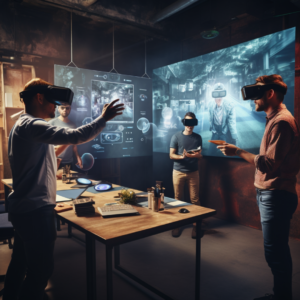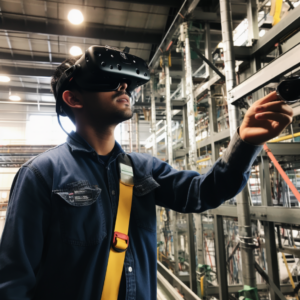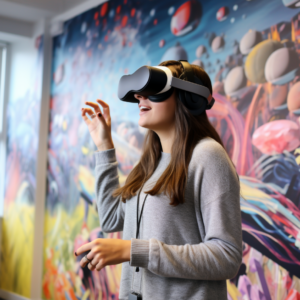In the rapidly evolving world of technology, businesses are continuously seeking innovative approaches to improve efficiency and effectiveness. One such groundbreaking solution that has emerged is VR Training Solutions for Business. VR training solutions are transforming how businesses approach employee training, fostering immersive and engaging learning experiences.

Immersive Training Solutions: Beyond Traditional Boundaries
VR has taken the traditional training model and revolutionized it by creating interactive, immersive training solutions. It allows employees to engage in a realistic, 3D environment where they can practice tasks, learn new skills, and experience real-world scenarios safely and cost-effectively. This hands-on approach significantly improves knowledge retention and understanding, making it a valuable tool in learning and development.
VR training solutions for business implementing outcomes
- Healthcare: VR has been used extensively in medical training, particularly in surgery. It allows medical professionals to practice procedures in a risk-free environment. Studies have shown that this kind of training can significantly improve performance. For example, a study published in the Journal of Surgical Education found that surgeons who trained using VR were 29% faster and made six times fewer errors than those who used traditional training methods.
- Aviation: The aviation industry has used VR for pilot training for many years. It allows pilots to experience and manage a variety of flight scenarios. A study by the University of London found that VR training improved pilots’ ability to handle a crisis situation, with performance improvements of up to 35%.
- Manufacturing: Companies like Ford and Boeing have used VR to improve their assembly line processes. Ford reported a 70% reduction in employees’ injury rate and a 20% improvement in manufacturing performance after implementing VR training.
- Retail: Walmart has used VR to train over 1 million employees in customer service and compliance procedures. They reported that VR training improved employee confidence and knowledge retention by 10-15% compared to traditional methods.
Example of VR training solution
VR Employee Training: Enhancing Engagement and Retention

One of the most significant advantages of VR employee training is its ability to provide a highly engaging learning environment. Traditional training methods can often be passive and uninspiring, leading to low engagement and poor retention of information. However, VR’s immersive nature compels active participation, dramatically increasing engagement and knowledge retention.
Harnessing the Power of the VR Training Solutions for Business
The term “Extended Reality” (XR) refers to all real-and-virtual combined environments, including VR. An XR training platform incorporates VR, AR (Augmented Reality), and MR (Mixed Reality) to provide a comprehensive training solution. These platforms offer a wide range of training scenarios, from soft skills practice like public speaking to complex technical skills like machinery operation or surgical procedures.
Virtual Reality Training Software: The Backbone of VR Training
At the heart of every effective VR training program is robust Virtual Reality Training Software. This software allows for the creation of tailored training modules that match specific business needs. From simple task training to complex, scenario-based training exercises, these programs provide the flexibility and customization necessary for effective training.
The Impact of Virtual Reality in Education and Training

While VR has shown its effectiveness in business training, its impact extends to the realm of education as well. In academic settings, Virtual Reality in education provides students with immersive, interactive experiences that enhance understanding and improve retention. This transformative approach to learning is changing the face of education, making it more engaging and effective.
Customized VR Training for Industries
Another advantage of VR is its versatility across different industries. Customized VR training for industries can cater to specific occupational skills and scenarios. For instance, in healthcare, VR can simulate surgeries for medical training. In aviation, it can simulate flying conditions for pilot training. This industry-specific approach ensures relevant and effective training.
VR Simulation Training: Replicating Real-World Scenarios
VR Training Solutions for Business allows for the replication of real-world scenarios without the associated risks or costs. Trainees can practice their responses to different situations, such as emergency responses or equipment malfunctions, within a safe, controlled virtual environment. This practical, hands-on training approach prepares employees effectively for their roles.
Enterprise VR Training: Scaling Up Learning and Development
For larger enterprises, scaling traditional training can be a significant challenge. However, enterprise VR training allows companies to provide consistent training to employees, regardless of location. This scalability, combined with the immersive, engaging nature of VR, makes it a potent tool for large-scale learning and development programs.
Conclusion
As technology continues to advance, so too does the approach to training. VR training solutions offer an innovative, effective, and engaging way for businesses to enhance their learning and development programs. Whether it’s enhancing employee engagement, customizing industry-specific training, or scaling up for enterprise-level training, VR holds the key to the future of business training.
Want to implement VR training in your business?
Contact us



